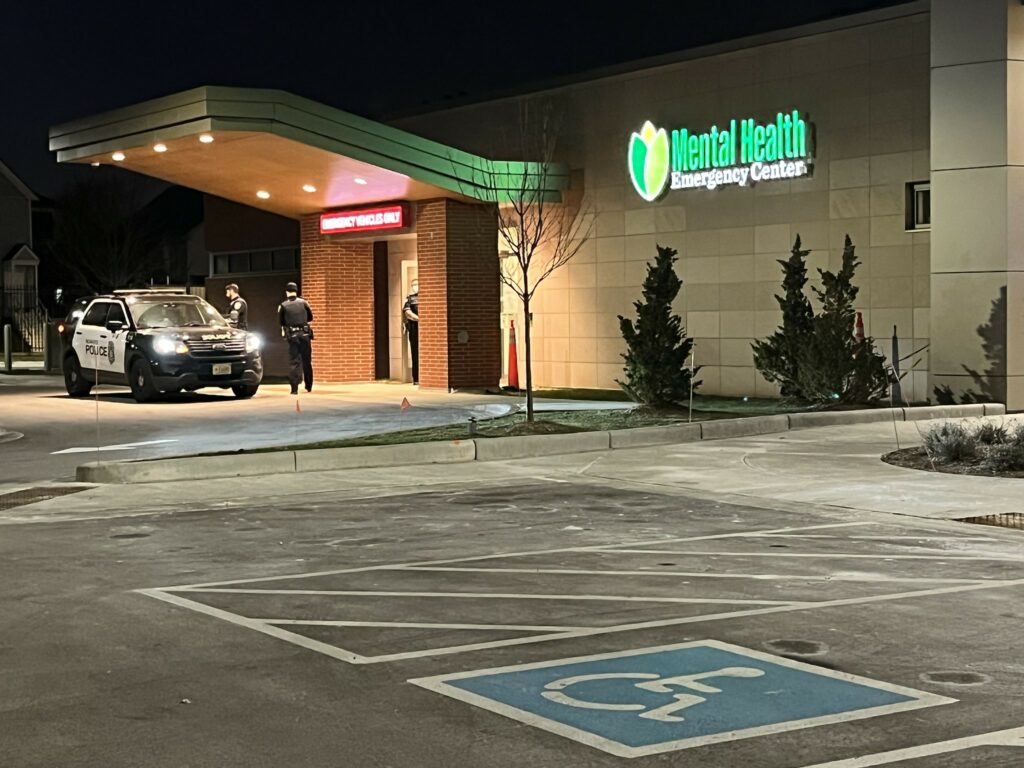County Mental Health Emergency Center Now Open
What you need to know about using its services.

Police officers transport an individual to the Mental Health Emergency Center, located at 1525 N. 12th St. (Photo by Devin Blake)
Milwaukee County’s new Mental Health Emergency Center, or MHEC, aims to specifically serve residents who are experiencing a mental health crisis.
MHEC, officials and staff insist, is for emergencies and emergencies only, and it is best understood as a typical emergency room — just one meant specifically for people experiencing an emergency related to their mental health. The center opened Sept. 6.
It is for people who are, essentially, in “a life-or-death situation,” said Mike Lappen, administrator of the county’s Behavioral Health Division.
And just like a typical emergency room, the goal is to stabilize and transition people as quickly as possible.
“Our role in the system of care is to assess, treat, stabilize and then get the patient to that next appropriate level of care as soon as possible,” said Kevin Kluesner, site administrator of MHEC. “Ideally, this would take place in less than 24 hours.”
“People have to understand — this is not a place where you make an appointment to refill medication or you want to establish a mental health provider and you can’t get in for a while,” Kluesner said. “MHEC is for people who are actively a threat to themselves or other people.”
MHEC is also not designed for patients who are seeking or need long-term psychiatric hospitalization or housing.
MHEC is a bridge to ongoing care and hospitalization but not these things in and of themselves.
Going to MHEC
MHEC is located at 1525 N. 12th St., on the North Side of the city.
Its location is an important feature of the county’s attempt to redesign its entire mental health system.
The old county-run psychiatric emergency room “was in an aging facility, located where nobody lives,” Lappen said. “We looked at heat maps of folks, and 93% of those folks (using the facility) lived in the city of Milwaukee.”
About 70% of the residents who used the old psychiatric emergency room lived in 10 ZIP codes — eight of which were on the North Side, and two on the South Side, he said.
Nicole Waldner, assistant chief of the Administration Bureau of the Milwaukee Police Department, suspects that the location increases the likelihood of patients using the facility.
When the county operated its old mental health emergency room, in Wauwatosa, “people had to call us for a ride. A lot of the people who are in need of services don’t have transport, and we’d take them if that’s what they wished. Now, they don’t need to do that with MHEC in the city. They can just go there,” she said.
What happens when you get there?
There are two entrances to MHEC – one for voluntary patients and the other for involuntary patients.
Voluntary patients can walk in or call the county’s 24-hour crisis line to arrange for their arrival. The number is 414-257-7222.
Police also often transport voluntary patients.
An involuntary patient is a person for whom the police are called, and an officer make a risk assessment and determines the patient needs to be evaluated.
The police will then transport the patient to MHEC for this assessment.
In either case, whether voluntary or involuntary, a patient’s general trajectory once at MHEC is the same.
Upon arriving at MHEC, a patient will undergo a brief medical assessment. If it is determined that the patient has an urgent medical need, he or she will be transported to a nearby medical emergency room. MHEC does not have the facilities for medical emergencies.
After the patient is medically stabilized, he or she can return to MHEC to address their mental health crisis.
After a patient is medically cleared, he or she will be assessed and triaged by a registered nurse and certified nursing assistant — both of whom have training and experience specific to mental health patients.
“They’re like teams working with patients,” said Kluesner.
Triage can look like different things for different patients. The nurse and nursing assistant may determine the patient can enter one of the milieus, a large common area where several patients are together that offers a comfortable, calmer place to decompress and engage with staff.
If a patient is more agitated or aggressive, the nurse and nursing assistant may determine the patient needs to be in their own care area, under one-on-one supervision.
After triage, a staff psychiatrist will determine what a patient needs in order to be stabilized, including short-term medication, rest or further engagement with staff.
After stabilization — meaning after the patient is no longer in crisis — the psychiatrist decides whether the patient can be discharged and connected to mental health services within the community or whether the patient meets criteria for an involuntary hold and requires admission to a psychiatric facility.
The criteria for an involuntary hold, governed by Chapter 51 of Wisconsin Statutes, is if someone is suicidal, homicidal or if they are somehow otherwise an imminent threat to themselves or someone else.
“Most patients,” said Kluesner, “do not meet these criteria and are connected to community resources that are as close as possible to the patient’s area of choice.”
MHEC has served an average of 132 patients on a weekly basis, as of Nov. 12, according to provisional data provided by MHEC. Twenty-four of these patients were admitted to a longer-term psychiatric facility, and the rest of the patients were referred to community-based resources, with particular emphasis on the county’s access clinics.
In addition to the new location, this reliance on community resources is also a significant shift in the philosophy and approach of the county’s mental health system.
There is much more of a “focus on community-based intervention, more upstream intervention — we want to do as much as we can to divert people — like expand housing availability, use peer support,” said Lappen.
Lappen said that having more community support helps avoid hospitalizations in the long run, which is “so much better for people – think about it. You can’t go to work, you know. It really disrupts their lives.”
If treatment can be delivered in a way “that avoids forcing treatment,” he added, then that will serve patients and their families much more effectively.
The county’s Mental Health Emergency Center is now open. Here’s what you need to know. was originally published by Milwaukee Neighborhood News Service
If you think stories like this are important, become a member of Urban Milwaukee and help support real, independent journalism. Plus you get some cool added benefits.





















Good news and about time!
Community “resources” are still very uneven. Getting a case manager to shepherd them through the system is no easy task. When MHEC passes them on to a community resource, do they follow-up to see that they are being taken care of properly? Emergency care is sometimes the only (or first) opportunity for a person suffering from mental illness to get needed attention.
I’ll add that, when a person who receives disability payments, hospitalization causes their checks to be delayed and possibly eliminated based on the length of time in which they are hospitalized. That means they can’t pay rent and may lose their housing.
We all know that the initial police assessment is also uneven. Training officers to make the distinction between an imminent threat to themselves or those around them is tricky. We all can (sometimes) be afraid of odd or weird behaviors but we all aren’t carrying a loaded gun.